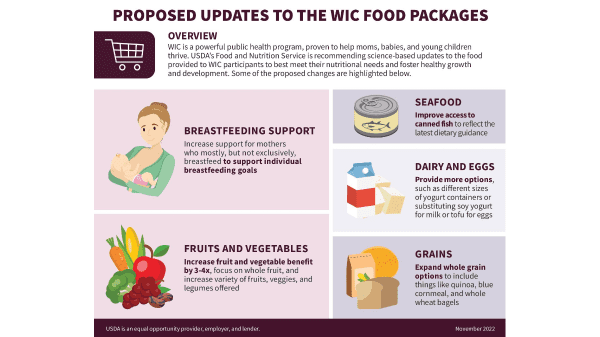
On November 17, the U.S. Department of Agriculture announced new proposed guidelines for the Special Supplemental Nutrition Program for Women, Infants, and Children (WIC) program.
The guidelines propose the following maximum monthly allowances for participants’ purchase of fruits and vegetables:
Children 1 through 4 years: $24
Pregnant: $43
Postpartum: $43
Partially breastfeeding: $47
Fully breastfeeding: $47
(By the way, these figures correspond reasonably closely to those in the British equivalent: the Healthy Start campaign.)
Other major proposed changes to WIC affecting fruits and vegetables:
“Require state agencies to authorize at least one other form of fruits and vegetables in addition to fresh.
“Require vendors to stock at least three varieties of vegetables.
“Expand what can be purchased” with the benefits.
Produce categories to which benefits are now extended: fresh-cut herbs (such as cilantro and basil); white potatoes (whose WIC status had been unclear); and larger sizes of packaged fruits and vegetables (such as party trays).
Allocations for fruit juice purchases have been reduced, allowing “the substitution of a $3 CVV [cash-value voucher] for the full juice amount.”
The new guidelines have been applauded by the International Fresh Produce Association BB #:378962.
“WIC is one of the crown jewels of our nation’s nutrition programs, and today’s announcement means that WIC children and families can truly access fruits and vegetables in amounts consistent with the Dietary Guidelines for Americans,” said IFPA CEO Cathy Burns.
Previous increases “resulted in a 1/3 cup daily increase in fruit and vegetable consumption in young children. This is a win for the millions of families who rely on the program and a huge step in our fight to ensure all Americans are meeting DGA [Dietary Guidelines for Americans] recommendations,” said Mollie Van Lieu, vice president of nutrition and health at IFPA.
Indeed, IFPA had called for “embedding a dedicated fruit and vegetable benefit within the Supplemental Nutrition Assistance Program” in its list of “Moonshot” recommendations, issued in July.
The FDA has set a public comment period for the proposed regulations: November 21, 2022 to February 21, 2023.
On the flip side: a recent report from the Rudd Center for Food Policy and Health at the University of Connecticut indicating that advertising of products poor in nutritive value (such as sugary drinks, candy, cereals, and corn and potato chips) have targeted black and Hispanic audiences in particular.
On November 17, the U.S. Department of Agriculture announced new proposed guidelines for the Special Supplemental Nutrition Program for Women, Infants, and Children (WIC) program.
The guidelines propose the following maximum monthly allowances for participants’ purchase of fruits and vegetables:
Children 1 through 4 years: $24
Pregnant: $43
Postpartum: $43
Partially breastfeeding: $47
Fully breastfeeding: $47
(By the way, these figures correspond reasonably closely to those in the British equivalent: the Healthy Start campaign.)
Other major proposed changes to WIC affecting fruits and vegetables:
“Require state agencies to authorize at least one other form of fruits and vegetables in addition to fresh.
“Require vendors to stock at least three varieties of vegetables.
“Expand what can be purchased” with the benefits.
Produce categories to which benefits are now extended: fresh-cut herbs (such as cilantro and basil); white potatoes (whose WIC status had been unclear); and larger sizes of packaged fruits and vegetables (such as party trays).
Allocations for fruit juice purchases have been reduced, allowing “the substitution of a $3 CVV [cash-value voucher] for the full juice amount.”
The new guidelines have been applauded by the International Fresh Produce Association BB #:378962.
“WIC is one of the crown jewels of our nation’s nutrition programs, and today’s announcement means that WIC children and families can truly access fruits and vegetables in amounts consistent with the Dietary Guidelines for Americans,” said IFPA CEO Cathy Burns.
Previous increases “resulted in a 1/3 cup daily increase in fruit and vegetable consumption in young children. This is a win for the millions of families who rely on the program and a huge step in our fight to ensure all Americans are meeting DGA [Dietary Guidelines for Americans] recommendations,” said Mollie Van Lieu, vice president of nutrition and health at IFPA.
Indeed, IFPA had called for “embedding a dedicated fruit and vegetable benefit within the Supplemental Nutrition Assistance Program” in its list of “Moonshot” recommendations, issued in July.
The FDA has set a public comment period for the proposed regulations: November 21, 2022 to February 21, 2023.
On the flip side: a recent report from the Rudd Center for Food Policy and Health at the University of Connecticut indicating that advertising of products poor in nutritive value (such as sugary drinks, candy, cereals, and corn and potato chips) have targeted black and Hispanic audiences in particular.
Richard Smoley, contributing editor for Blue Book Services, Inc., has more than 40 years of experience in magazine writing and editing, and is the former managing editor of California Farmer magazine. A graduate of Harvard and Oxford universities, he has published 12 books.




